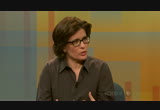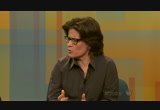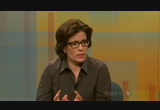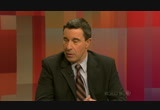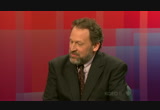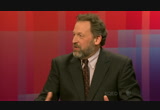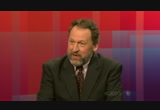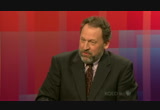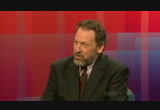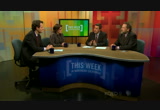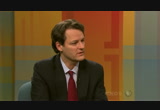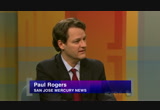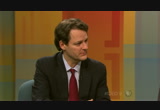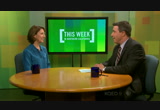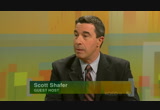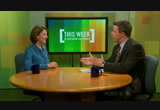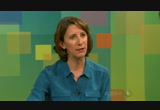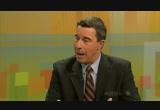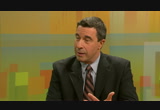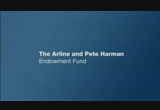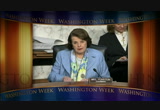tv This Week in Northern California PBS February 8, 2013 7:30pm-8:00pm PST
7:30 pm
good evening, and welcome to "this week in northern california." i'm scott shafer. well, we hoped we'd be talking about this week's super bowl victory parade for the san francisco 49ers, but it didn't quite work out that way. the good news, well, we still have plenty to delve into. joining me on our news panel tonight are paul rogers, "san jose mercury news" environment writer. peter hecht, "sacramento bee reporter" and author of "weed land" due out later this year from university of california press. and kara swisher, editor of "all things digital." well, silicon valley's economic growth is outpacing the rest of the state in terms of jobs and per capita income. posting some of the highest numbers since the recession. that according to a study released today at the annual state of the valley conference in san jose. kara, you were there with the movers and shakers in the valley. give us a sense of the mood. are people feeling good about the economy? >> it's the one part of the economy across globally that the
7:31 pm
u.s. excels in and continues to excel in, and, you know, there's been a lot of job growth in the area, a lot of innovation. some of the stocks are up, not all of them. it's a good time right now especially in an economy that has issued all over the place. >> one of the things that came out in the state of the valley report is san francisco has grown as a tech hub and it's now really san jose, san francisco and everything in between is really the tech center. talk more about that. how did that happen? did it happen overnight? >> well, some of the lovely ed lee tax cuts are nice. for twitter and things like that. there's a certain class of people in these new company like twitter, like zingo, some of the others, many, many, others that want to live in a city, live in a urban environment. don't want to get on a google bus and drive down 101 every day. google and others want to serve the population of their employees. it's food to have opportunities in both places. so this urban, i call them urban hipsters essentially want to
7:32 pm
stay in san francisco. they're opening offices here. >> does san francisco have a particular niche in the industry or not really? >> you know, it's not the device-heavy kind of cisco, the big data kind of things. it's more in the consumer space, mostly consumer, cloud is here, there's all kinds of companies like that that are here and are in the software or the app space. >> one of the other things that happened this week is texas governor rick perry was making a lot of news saying california's high taxes and tough environmental laws are going to make companies and rich people in the bay area want to move to texas. he's coming here to make this pitch. what are the chances of people en masse leaving silicon valley to go to texas? >> not so much. he makes a lot of noise all the time, doesn't he? the kind of people that work at these tech companies, the very different type of personalities, much more diverse, much more tolera tolerant. i think it's a place they like living. the san francisco area. there are issues around taxes and the way you live and what you can get there. i think there's a lot of tech in
7:33 pm
texas and austin. dell is going for a new life now with this new buyout they announced this week. so there is a very vibrant culture there and south by southwest is coming up soon. i think this is analog even though we're living in a digital age. just like hollywood or detroit, this is the analog center of the tech revolution that continues. >> i mentioned certainly a lot of the tech folks would love to have a lot of things they have in texas in terms of lower regulations and taxation. >> they don't want any regulation. >> right. stay out of their way. >> yeah, exactly because they know what's right for everything because they're smarter than you are. i think one of the things that a lot of the people -- what's interesting about tech is the founders are running the companies. think about that. you know, the founders are not running the car companies, not running hollywood. the founders like living here. they went to stanford, went to berkeley. they like living in this area. so the center of these companies are going to stay here until that changes. i think for good reason. you have stanford here, the vcs here, the entrepreneurs, the
7:34 pm
companies that shoot off of the big companies. it's an eco system that's very hard to beat. >> there is -- go ahead, paul. >> i was in silicon valley, people are talking about what is the next big thing? did you get any buzz at this conference, or you probably brought some, yourself. but what is the next big thing or two that you see sort of around the corner for silicon valley? >> it's two things. one mobile. shift is mobile is so fast and quick, so many companies, this mobile revolution, tablets and devices like that. every company has to rethink its strategies around it. i think mobile is the number one most important trend going on. these devices continue to become cheaper and more robust and ability to do more on them. so that's really the big trend right now going on. the second one is big data. the ability to take all this data and do stuff with it and more interesting ways. the other one is sort of computational things within the internet of things it's called. like the idea of the google car, or the google glass.
7:35 pm
but, you know, nest in your home. or these parking meters we have and all kinds of parking apps. >> smart meters. >> smart meters. your phone being at the center of it powering all this. so i think probably the internet things is the most interesting thing because who deoesn't lovea self-driving car? it's irresistible. the glasses. things like that. >> are you going to wear those glasses? >> never. i happen to be married, but i some day want to date, perhaps. so, you know, it's just -- they're super nerdy. they will get more attractive and eventually just be the eye. >> like contracts. >> like the terminator or something like that. >> one of the things that came out also in the study was that there's a growing income disparity, especially minorities, african-americans, latinos being left behind. other than giving lip service to that kind of thing, do the leaders in the valley really care about that? >> it's a whole lot of white guys. young white guys. it's more diverse and tolerant. compared to other industries,
7:36 pm
it's way further down, but they definitely -- we talked about that on one of the panels today. there isn't enough diversity in the industry. it's because, you know, girls aren't coming up in computer science enough. not coming up in computer science enough. everything focuses on the engineer and computer science. until that changes, you're not going to see as diverse as a community as you want. it's not just lip service because diverse cultures make better companies in these places. yes, it's a problem, and, you know, that's what's going to happen. this elite core of workers, and you're going to have the people that serve them. so that's an interesting problem for the bay area. >> what about, they can address some of those things with schools and education. they don't necessarily have to be working in the tech industry. was there much discussion about that? >> the whole argument of the tech industry is they're creating jobs. uber, everyone becomes an entrepreneur. the new tech revolutions, everyone is an entrepreneur. not everyone can be an entrepreneur. it suggests the society of entrepreneurialism over the basic jobs we think of.
7:37 pm
>> kara, thanks very much. heady times in silicon valley, and the same time, storm clouds over the medical marijuana industry. the state supreme court this week hearing arguments about a case involving just how much latitude local governments have in banning pot dispensaries even though voters said medical marijuana is legal. peter, what's at the heart of that argument? >> there's two narratives to follow. one is a specific narrative. this narrative, the supreme court seems predisposed to uphold the right of local cities and counties to ban medical marijuana dispensaries. the larger narrative is the vagueness of california's medical marijuana laws. even though we were the pioneering state for legalizing medical marijuana. and basically we were at the point now where we have a $1 billion industry that hangs on the thread of language, which essentially says that qualified marijuana patients can collectively or cooperatively cultivate marijuana for medical purposes. that's it. it doesn't say anything about distribution. it doesn't say anything about
7:38 pm
transactions of money. it doesn't say anything about stores or storefronts. so california just has not put rules in place. another state like colorado has. it's getting less federal intervention that we're facing right now. there's a lot of issues being raised that come out of this matter. >> so the question is why? why hasn't the legislature -- now they have a supermajority of democrats. what would -- what could happen that the legislature hasn't done? just bringing clarity to those questions? >> there's two issues. there's a lack of courage in the legislate clure to take on the issue. despite medical marijuana is overwhelmingly approved by voters. law enforcement doesn't support legislation. lawmakers don't want to take it on. and the marijuana community, itself, is very divide ed and they're leaning over backwards to satisfy the narrow list of constituencies and they want regulation in name, but they're really reluctant to seek
7:39 pm
regulation in specific detail. so it's very cloudy. >> you mentioned colorado. it was interesting to me that colorado voters legalized marijuana the last time around in november for pretty much all uses as i understand it. california voters a couple cycles ago didn't. are the pro-legalization people going to take another run at it on the california ballot in, like, 2016? i'm assuming they wouldn't want to go in an off year, 2014. when are they going to put california in the states that legalized it entirely? >> they are going to put it on the ballot in 2016. some may try to in 2014. the major funders are staying out until 2016. when california, proposition 19 was on the ballot in 2010, it was a non-presidential year. >> tea party. >> it was winning the polls by 8 to 11 points depending what poll you checked. eric holder came out, he got a letter from former drug enforcement administration administrators saying, you've got to stop this.
7:40 pm
he comes out and basically says, we're not going to stand for legal marijuana in california and anybody who pays taxes to california is going to be admitting to a federal crime. guess what happened in colorado? none of that. colorado is a swing state. the dea administrators wrote a letter at this time. holder stayed silent. >> what about washington state? that's a blue state. why the disparity? does seem they're kind of picking on california in a way. >> well, it really boils down to our earlier discussion of regulation. colorado has very rigorous regulations. every single person who works in the medical marijuana industry in colorado is licensed and background checked by the state. the dispensaries grow their own marijuana and videotape cultivation rooms. they file shipping manifests to track the marijuana from the room to the dispensary, and then all the transaction are videotaped. california has none of that. >> that's inevitable when these things start to really move all
7:41 pm
across the country. they're going to have to behave this way just like they do with the liquor industry and others. they're not going to be able to do the loosey-goosey thing. >> in the concern about diversion, and so what's happened -- >> meaning? >> meaning -- >> shrinkage. >> taking it from the legal market and putting it in the illegal market, the black market. the colorado diversion is much harder than california. california is not comfortable with licensed employees, not comfortable with videotaping and there's a mythology that evented in california anybody with a medical marijuana card can make a living selling in dispensaries. the movement wants to make sure people in humboldt and mendicino has access to the market. california cut small growers out of the market because it was difficult to enforce. so california is a much bigger market but it's also much older, much more established and much more factionalized and hence much more complicated. >> the court made it sound like they weren't going to throw
7:42 pm
these guys a bone at all and allow cities to continue to shut down dispensaries. that's the "reader's digest" version. >> it didn't look like it was going well in there for advoc e advocates. colorado allows local bans. but the key thing for the movement is in terms of their longevity and their health would be some action in the legislature. i'm not convinced it's going to happen. i think it has a better chance happening this year than last year. >> it's all good news for wyour book when it comes out, right? >> people love pot. >> people love pot. it does draw a lot of interest. on the other hand, people don't love sharks so much. paul, this week, i have mixed feelings about this because i'm a scuba diver. the state fish and game commission moved a step closer to possibly protecting the great white shark, putting it on the endangered species list. i thought they could fend for themselves. what is it about these sharks that makes them so vulnerable? >> people do love sharks in california, just like they love mountain lions. they love these charismatic,
7:43 pm
they like to follow them. in california there's a lot of jokes about sharks eating people. if you actually look at the data going back to 1952, tens, probably hundreds of millions of people have gone to the beach in california and got in the water they have surfed, scuba dived. i'm a scuba diver, too. only 13 people have been killed by white sharks since 1952. more people have died from bee stings and dog bites and hitting deer with their cars than have died from white sharks. what the state fish and game commission did this week on wednesday, they voted unanimously to move forward with listing the great white shark in california on california's endangered species list. and what that means is, the state will take a year to study it, they'll come back and vote again next spring. i would expect there's a good chance they're going to put it on the list which will mean that fishermen in southern california who use these big gill nets may be shut down. they'll have to bring the nets up every 24 hours so they don't drown juvenile sharks in there.
7:44 pm
the law may even allow environmentalists to block coal-fired power plants because when you burn coal, you burn mercury. it vaporizes. it goes up and rains down into the water. these sharks have high levels of mercury because they're at the top of the food chain. little fish get the mercury, it works its way up. if you show mercury is harming sharks, it may be harder for the coal fired power plant. >> even though the movies depict this idea of a shark being more dangerous, except only when you're in the water on a surfboard are they more dangerous. >> absolutely. something like 70 million sharks a year, this is all types, not just white sharks, are killed mostly for finning. there's a huge market in china as we know. what's interesting about california, california has led the way in the past on shark protection. in 1993, pete wilson signed a law that banned all hunting of sharks and great white sharks out to three miles in state waters. jerry brown as we may remember in 2011 signed a bill banning
7:45 pm
the possession or sale of shark fins which got a lot of the, you know, chinese restaurants in l.a. and the bay area upset because it's illegal to serve shark fin soup. but a lot of environmentalists were really nervous. there have been a couple recent studies that estimated the population at something like 300 to 400 adults. and, you know, if only half of those are female, they're saying that's a pretty low number. >> yeah. we're talking now about putting the shark on the state endangered species list. how is is that different from the federal endangered list? >> california is one of the only states that has its own separate endangered species list. it has similar rules to the federal one. the feds are looking at great white sharks right now as well and are going to decide in june whether to lift them. what's different is in california's law, once you become a candidate and you're being studied, the rules protecting endangered species kick in. the federal rules don't. and so you're already listed. so right now these fishermen in southern california have about 90 days to apply for a permit which they may not get, and these fishermen produce
7:46 pm
something like 75% of all the halibut caught in california. they're really upset. and, you know, it's an interesting thing because the great white shark scientists, the top scientists in the state are saying wait a minute, we're motte sure they need to be listed. we don't have enough data. they don't have a trend line showing whether the population is going up or down. they're worried it's going to be harder to do research and get permits for their own work, and, you know, it's a new kind of science to put satellite tags on these animals, take photos of their fins and measure them and put them in databases. very little is actually known about them when you consider how much ink and tv time they get. >> other than fishermen, who's going to be the big lobbyists to keep that off the list? >> you know, i don't know that a lot of these top scientists are going to actually be really begging for it. a few have written letters. the chair of aquatic biology at cal academy of science, 40-year shark expert, is saying i don't think they need to be listed. >> who does? >> mostly the environmentalists
7:47 pm
at this point. >> all right. we'll come back to that no doubt. >> one year from now. >> one year from now. thank you, paul. now we go on to another environmental story. this one on dry land. and it involves the san francisco bicycle coalition. over the past six years, the number of commuters using bikes in the city has risen dramatically. they'd like nothing more than to see those numbers continue going up. and to that end, the influential advocacy group is lobbying hard for the city's transportation agency to pour a bigger chunk of its budget into bicycling improvements and develop a plan to make san francisco on par with cities like amsterdam, where commuting by bike is standard practice. earlier today i sat down with leah shahum, head of the bike coalition, to hear her vision for the future of cycling in the city. leah, thanks so much for being here. >> thank you. >> let's talk about money and plans. the city is proposing to spend about $200 million to improve and expand biking in the city. and your group says, that's nice, but it's not really
7:48 pm
enough. in fact, it's not even close to enough. so if 200 million isn't enough, what would you like to see? how would the money be spent? >> that's right. the city's plan calls for spending $500 million over the next 5 years to bring san francisco up to what is really a top tier bicycling city. look at places like copenhagen, 30%, 40% of trips made by bicycle, it's possible. san francisco, itself, increased biking by 70% just in the past 5 years. the city has set its sights for dramatically increasing even more the number of bike trips in the city and has actually set that money goal at $500 million over the next 5 years. we think that's a worthwhile goal. >> you think it should be more, though? and how? tell me how should the money be spent? we're seeing more bike lanes. we're seeing other things that are making it easier and more visible for bikers to be safe on the roads. how should that additional money be spent? >> that's right. one of the great things about investing in bicycling is that it's remarkably cheap and pretty
7:49 pm
quick to make the difference. as much as we need to also invest in transit systems, we also know what a long lead time there is there to build whether it be a bus rapid transit system or central subway or new roads, that's a very long time and a lot of money. we need to invest in those, but in the meantime, just in a matter of years, we can paint new bikeways, we can add new bike parking racks, we can really create education and encouragement systems that help literally tens of thousands of more people bicycle for pennies on the dollar of what these other major transportation projects cost. so really what we're calling for is the city to invest bwisely ad quickly in what we think will be a quick way to move more people around to their jobs, to school, everywhere. >> but the pool of money, the pie, is, like, one size, more or less. >> that's right. >> where are you going to take money away from? >> good point. san francisco is well fully under spending right now. it's less than half of 1% of the city's transportation capital budget. what we're calling for in
7:50 pm
spending that larger amount would still only be 8% of its overall capital budget. >> that's a huge -- that's 16 times. 16fold increase. >> that's right. but moving what we think can be a very significant number of people. going from what is now estimated to be 3% or 4% of trips to up to 20% of trips by bicycle in the year 2020 which is the city's goal. so we know it is an increase, but still a very relatively modest number of the overall budget. >> so what would we not spend money on then? >> great point. we have to find new sources first and foremost. opportunities coming up such as the vehicle license fee. the state has given us the ability and we hope to see that ability used soon to slightly raise the vehicle license fee here in the city and have that go toward transportation purposes. there's different bond measures being considered. and there's ways we can use the existing funds more creatively. >> let me ask you, if you're a driver, i drive and i bike and i walk. but if you're a driver, you're seeing more parking meters go up. you're seeing the parking meter fines in some cases, enforcement going up.
7:51 pm
you're seeing parking spaces being taken away for bike lanes. so i'm wondering, is part of the overall strategy to make it a little less comfortable to drive a car in the city? >> right. a good question. the city has set a goal of reducing private auto trips. it's part of the transportation agency's overall strategy. to reduce auto trips, the next five years, by about 11%. how will they do that? they'll grow transit trips. they'll grow bicycling. walking, taxi car trips and car share. there's a method to get to that. what i would say, particularly with things like parking, there's a goal to really think about parking management. how do we have more parking turnover so people aren't necessarily sitting in one space all day but turning over so businesses are getting more customers? >> when you look at san francisco, and some of the things we've done here in the city to make biking more popular, and it does seem to be working, how do we compare? how do we stack up with other cities of a similar size? >> we're doing pretty well, but we're not at the top of the list. we have place like portland that have higher bike ridership
7:52 pm
number than our own. we have places like chicago that are literally building dozens of bikeways per year. these are physically separated bikeways. i want to make that note. we really have evolved the thinking. >> when you say physically, do you mean with a raised road like they do, say, in amsterdam and copenhagen? >> that's right. it could be an actual physical separation or may be places like you may know market street wihee a section of the street, the bikeway has been painted green. there are white posts in between. these are really cheap and inexpensive and quick ways to make separation between the motor vehicle traffic and bicycle traffic. this is what we're seeing cities across the country do, new york city, portland, washington, d.c., is a great example. >> i was in d.c., and mexico city, both have bike sharing now. is that in the pipeline for san francisco? what's taking so long? >> i'm happy to report it's coming. san francisco and the south bay actually down to san jose will have bike share coming.
7:53 pm
we hope this summer. it's been a bit delayed. that's been frustrating. the city is committed to started a thousand bike share program. we're seeing a ton of interest from companies. a lot of people who see this as a mobility need for their workforce. >> a few seconds left. what would you say is your dream? what would you like to see, big picture, in three, five years in san francisco? >> we want to see every neighborhood in the city connected with great bikeways that are inviting, safe, comfortable, for people ages 8 to 80. so that thousands, tens of thousands of people who want to be bicycling in our city can be. >> what is your goal? >> our goal is 100 miles of bikeways by the year 2020 and reach the goal of 20% of trips of people biking by 2020. >> leah shahum. ride safely. >> thank you so much. see you on the bike lanes. >> that's the all the time tonight. thanks to all of guests. peter, paul, kara.
7:54 pm
visit kqed.org/thisweek. find our show archives. also subscribe to our newsletter and podcast. if you feel like it, share your story ideas and thoughts about the program. all those things you can find, again, at our website. i'm scott shafer wishing everyone a happy lunar new year in this the year of the snake. good night.
7:58 pm
gwen: secret killings, political positioning, and a big lawsuit, all the ingredients for a busy week in the nation's capital tonight on "washington week." tough talk from the nation's likely next top spy. >> we only take such actions as a last resort to save lives when there is no other alternative to taking an action that's going to mitigate that threat. gwen: when is it ok to use u.s. drones to kill americans? and when does congress get to
7:59 pm
know about it? >> if the executive branch makes a mistake and kills the wrong person or a group of the wrong people, how should the government acknowledge that? gwen: closer to home, did the folks who issue credit ratings make the mortgage crisis worse? the justice department says yes. >> we believe that s&p played a significant role in helping to bring our economy to the brink of collapse. gwen: and on politics, republicans and democrats map out the future. >> it's important not to read too much into any particular political victory, because this country is big, it is diverse, it is contentious, and we don't have a monopoly on wisdom. >> to uphold this legacy of those who have come before us, washington will need to make some choices. and in a divided government, some choices. and in a divided government, these
193 Views
IN COLLECTIONS
KQED (PBS) Television Archive
Television Archive  Television Archive News Search Service
Television Archive News Search Service 
Uploaded by TV Archive on

 Live Music Archive
Live Music Archive Librivox Free Audio
Librivox Free Audio Metropolitan Museum
Metropolitan Museum Cleveland Museum of Art
Cleveland Museum of Art Internet Arcade
Internet Arcade Console Living Room
Console Living Room Books to Borrow
Books to Borrow Open Library
Open Library TV News
TV News Understanding 9/11
Understanding 9/11

